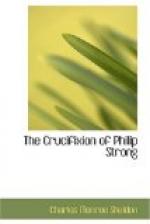The nervous, irritable little man who had spoken oftenest rose to his feet and exclaimed, “You can count me out of all this, then! I wash my hands of the whole affair!” and he went out of the room, leaving the rest of the Board somewhat surprised at his sudden departure.
They remained about a quarter of an hour longer, discussing the matter, and finally, at Mr. Winter’s suggestion, a committee was appointed to go and see the minister the next evening and see if he could not be persuaded to modify or change his proposition made in the morning sermon. The rest of the trustees insisted that Mr. Winter himself should act as chairman of the committee, and after some remonstrance he finally, with great reluctance, agreed to do so.
So Philip next evening, as he sat in his study mapping out the week’s work and wondering a little what the church would do in the face of his proposal, received the committee, welcoming them in his bright, hearty manner. He had been notified on Sunday evening of the approaching conference. The committee consisted of Mr. Winter and two other members of the Board.
Mr. Winter opened the conversation with considerable embarrassment and an evident reluctance for his share in the matter.
“Mr. Strong, we have come, as you are aware, to talk over your proposition of yesterday morning concerning the parsonage. It was a great surprise to us all.”
Philip smiled a little. “Mrs. Strong says I act too much on impulse, and do not prepare people enough for my statements. But one of the greatest men I ever knew used to say that an impulse was a good thing to obey instantly if there was no doubt of its being a right one.”
“And do you consider this proposed move of yours a right one, Mr. Strong?” asked Mr. Winter.
“I do,” replied Philip, with quiet emphasis. “I do not regret making it, and I believe it is my duty to abide by my original decision.”
“Do you mean that you intend actually to move out of this parsonage?” asked one of the other members of the committee.
“Yes.” Philip said it so quietly and yet so decidedly that the men were silent a moment. Then Mr. Winter said:
“Mr. Strong, this matter is likely to cause trouble in the church, and we might as well understand it frankly. The trustees believe that as the parsonage belongs to the church property, and was built for the minister, he ought to live in it. The church will not understand your desire to move out.”
“Do you understand it, Mr. Winter?” Philip put the question point blank.
“No, I don’t know that I do, wholly.” Mr. Winter colored and replied in a hesitating manner.
“I gave my reasons yesterday morning. I do not know that I can make them plainer. The truth is I cannot go on preaching to my people about living on a simpler basis while I continue to live in surroundings that on the face of them contradict my own convictions. In other words, I am living beyond my necessities here. I have lived all my life surrounded by the luxuries of civilization. If now I desire to give these benefits to those who have never enjoyed them, or to know from nearer contact something of the bitter struggle of the poor, why should I be hindered from putting that desire into practical form?”




